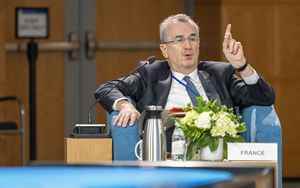(Finance) – The European Central Bank (ECB) could pose an end to net asset purchases already in the third quarter of 2022, without triggering a rise in interest rates right away afterwards and thus avoiding “fueling fears of an excessively brutal effect”. She said it Francois Villeroy de Galhau, president of the Banque de France and then a member of the Governing Council of the ECB, during a speech at the London School of Economics. Distancing the end of bond purchases (in particular with the APP program, as the PEPP will end in March) from the rate hike “could give more space for fine-tuning” monetary policy decisions, “an advantage in uncertain times” .
Villeroy said the first point the ECB Governing Council should consider at its next meeting in March is the calendar of net asset purchases. “Keeping them open starting in October would not be appropriate, as it could tie our hands too long,” she stressed, adding that “now there are far fewer reasons to keep pressing the accelerator pedal as we increase our stock of assets, as inflation is converging towards our target of 2%. “The Governor of the Bank of France continues to believe, however, that it is useful to let some time pass between the end of net purchases of PEPP in March and the end of APP net purchases. “But this one reduction could follow a bimonthly or monthly rather than quarterly pace, and therefore APP purchases could end in the third quarter“, he pointed out.
“In parallel, another way to strengthen optionality could be to remove the word “short” from forward-looking indications on asset purchases – he added speaking to the English students – This would be a possibility to break the almost automatic temporal link between the two instruments, while maintaining sequentiality. Optionality would mean that the upside could take longer. ”According to Villeroy, one a decision on the rate hike may not be taken before the June meeting, howeverin order to have more time and to consider the most up-to-date inflation outlook.
“Obviously we should maintain optionality as we navigate this path, but we should also maintain flexibility: to ensure not only the right stance of monetary policy, but also its correct transmission across the euro area, in terms of asset classes. and jurisdictions. Optionality and flexibility reinforce each other on our path to gradual normalization“, is the conclusion of the member of the Governing Council of the ECB.
